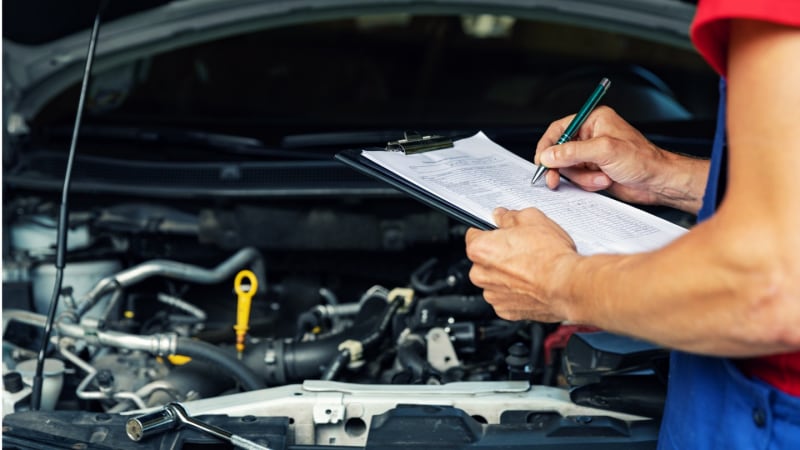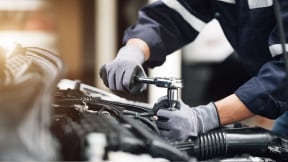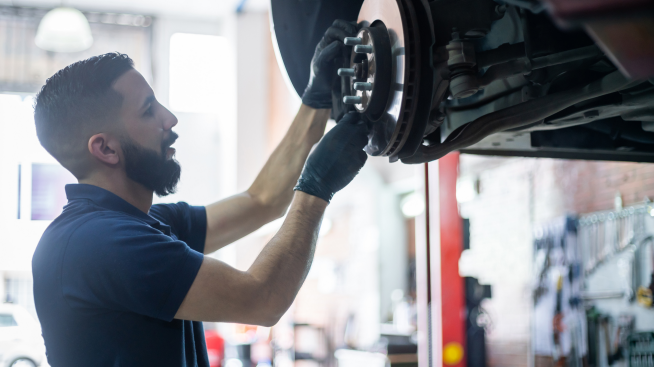Should I take my car to a dealer for service?

Quick insights
- Access to brand-specific technicians, parts and diagnostic equipment rank among the top perks of taking your car to a dealer for service.
- A dealer might even be required to provide certain vehicle services if you want to retain your car’s warranty.
- There are pros and cons to having your car serviced at most popular choices, dealers and independent mechanics.
Car maintenance and repairs are often unavoidable, even within the first year or two of a vehicle’s life. Dealerships are often ready and equipped to service cars, not just sell them. Is it preferrable to an independent shop, though?
In this article, we’ll explore the differences of each vehicle service option, along with their pros and cons.
Dealership vs. independent mechanic
To distinguish the two, think of dealer technicians as specialists and third-party mechanics as professionals with more versatile skills. Both probably have the knowledge and tools needed to work on your car. However, dealer services can be limited by the make of a vehicle. Independent mechanics are limited by their tools, parts and expertise.
Dealers might also be important to consider for servicing leased vehicles and very specific repairs. A safety recall, for example, might have to be performed to retain your vehicle’s warranty. This can make the dealer a more confident choice for servicing your car. In such situations, independent mechanics might even agree and direct you to a dealer.
If these differences don’t help you choose between a dealer and independent mechanic, weighing the pros and cons might.
Pros and cons of dealership service
Here are some of the advantages and disadvantages of taking your car to a dealership for service.
Pros
- Original parts: Dealer service centers often have a robust inventory of parts specific to the manufacturer’s range of vehicles. These are called original equipment manufacturer (OEM) parts. The access to this inventory could save time on your car repair or service.
- Recalls: Dealers are often the go-to place for repairs related to manufacturer recalls. If you’ve been contacted by mail or phone about a recall, it’s important to follow the instructions and make sure you know where to take it.
- Warranty coverage: Depending on the repair, you may have to take your car to a specific place to remain under warranty. This can be true for safety recalls, as well. If your vehicle is still under warranty, getting service at a dealership might be required to maintain your coverage.
- Brand-name benefits: Dealer technicians and facilities have to meet certain criteria set by the automaker. The benefits of this corporate affiliation and training can ensure that mechanics have updated technical skills and provide good customer service.
- Hospitality options: Dealer service centers often work on several vehicles at once, and many people choose to wait. Most centers have waiting rooms for this reason. Here you might enjoy amenities as simple as places to sit, Wi-Fi, TV and light refreshments. For more complex and extensive repairs, a dealer might also loan you a vehicle to avoid disrupting your day-to-day.
Certain services may be complimentary if you purchased a vehicle from a dealer. For example, an oil change or annual inspection at the dealer could be included in the contract when you buy a car.
Cons
- Cost: The manufacturer usually sets the prices that dealers charge for work, and the costs can be more expensive. They’re based on part prices, along with the standard of work and customer service the brand expects from its shops.
- Availability: Dealers often have to perform manufacturer recalls, which can fill up the time that’s available to perform other services. Whether you have an urgent issue or try to plan well ahead, you’re still subject to the dealer’s availability.
- Location: Your first thought when buying a car probably has more to do with the make and model than where your nearest dealer is. Although networks of car dealerships can be vast, there may not be an option close to your home or employer. Added travel time can mean added expense, not to mention impacting your workday or weekend plans.
Pros and cons of independent mechanic service
There are distinct advantages and disadvantages of bringing your car to an independent mechanic, as well.
Pros
- Broad expertise: Independent mechanics often have experience working on a variety of vehicle makes and models. However, mechanics may also be well-equipped to service specialized types like foreign, commercial and electric vehicles.
- Credibility: The services that nearly every car owner needs—oil changes, tire replacements, state inspections—might be the bread and butter of an independent mechanic’s business. These shops are usually authorized and credible for such common maintenance.
- Personalized service: Independent mechanics are likely to develop long-term relationships with repeat customers. This can lead to a more tailored approach to vehicle maintenance and repair. Plus, small shops don’t typically have big advertising budgets, so many independents rely on satisfied customers to spread the word.
- Price: Independent mechanics set their labor rates and can use aftermarket parts more often than dealers. This offers the business owner more control over the prices of their services, possibly translating to cost savings for customers.
Cons
- Warranty considerations: Getting certain service at an independent mechanic can void some vehicle warranties. It’s important to check your warranty documentation before agreeing to car service outside of a dealership.
- Fewer OEM resources: Independent shops might not have the brand-specific diagnostic equipment or OEM parts that are accessible to most car dealers. While aftermarket parts can be comparable alternatives, there are times when there’s no substitute for OEM parts. A lack of resources could limit the range of services or lengthen the time it takes a mechanic to perform repairs.
- Limited amenities: An independent shop may not be able to offer the level of amenities that dealerships tend to. That could mean no waiting rooms or loaner vehicles. You might need a ride to drop off and pick up your car.
Can I bring my car to any dealership for service?
The answer really depends on the service. For routine services—state inspections, emissions tests, tire alignment, oil changes and the like—yes, a dealership should be fine. For most manufacturer recalls? Almost certainly, as you might not be able to have that work completed elsewhere.
Despite the range of vehicle services a dealer can handle, you’ll still be subject to their availability and its network of locations.
In summary
Dealers can offer brand-specific expertise, repairs under warranty and high access to OEM parts. You might also have to use a dealer for service based on the terms of a vehicle lease or warranty. Independent mechanics are often known for having broader expertise, offering personalized service and sometimes having better prices.
Choosing between a dealer and independent mechanic can ultimately depend on your situation.



